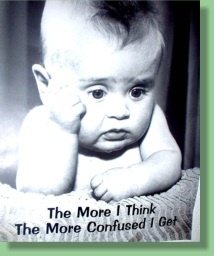 Last week we talked about some confusing words, and we’re on a roll….here are ten more commonly confused words.
Last week we talked about some confusing words, and we’re on a roll….here are ten more commonly confused words.
1. Anyway/Anyways: NO, anyways is not the plural of anyway! (Jut kidding.) There is no anyways. That goes for anywhere, everywhere, and somewhere. There are no anywheres, everywheres, or somewheres.
2. Bad/Badly: This is a tough one. Bad is an adjective. For example: Bad taste, bad dog. Bad describes a noun. Badly is an adverb and, as such, describes a verb. For example: I did badly, I play tennis badly. Okay, that is the easy part. But there is, of course, an exception to this rule. When you use certain verbs, called linking verbs or being verbs, you use the adjective rather than the adverb. These verbs include the verb to be (I am, you are, etc.) and the verbs that can sometimes express emotions or senses (feel, taste, smell, look, sound). Some verbs can be either action verbs (taking an adverb) or linking verbs (taking an adjective), depending on how they are used.. Here are some examples:
The dog is bad. (but The dog is behaving badly.)
I feel bad. (If you feel badly, that means there is something wrong with your fingertips.)
The pizza tastes bad. (Compare to the action meaning of taste: I taste the sugar in this.)
This meat smells bad. (Compare to the action meaning of smells: I smell the chocolate.)
This dinner looks bad. (Compare to the action meaning of looks: I look at the dinner on the table.)
The CD sounds bad. (Compare to the action meaning of sound: I sound the horn.)
Note: It is also proper to say I feel good. However, you can also say I feel well (an adverb) because well is acceptable meaning a state of health.
3. Bring/Take: These two words go in opposite directions. You take something away, but you bring it back.
4. By accident/On accident: It has always been by accident, but lately I hear young people saying on accident. After all, we say on purpose, right? But, as far as I know it is still correct to say by accident.
5. Capital/Capitol: Usually the word you want is capital with an –al. It is capital letters, and Sacramento is the capital of California. Capitol with an -ol is used to refer to the actual Capitol building.
6.Cite/Site/Sight: Cite is a verb meaning to refer to something: She cited the my new book in her speech. Site is a noun and refers to a place: There was an accident at the construction site. Sight is usually a noun, but can also be a verb: That is a great sight to see. I can sight the building from here.
7. Climactic/Climatic: The first one, climactic, comes from climax. The second one, climatic, has to do with the weather and comes from climate.
8.Cloths/Clothes: When I wash the car, I use cloths. When I go shopping, I buy clothes. These two words are pronounced differently. The first has a short sounding o, and ends with an s sound. The second word has a long o sound and ends with a z sound.
9. Conscience/Conscious: The first hurdle is being able to spell these words in the first place! Conscience is a noun, and is the thing that gets guilty and tells you that you may have done something wrong. Conscious is an adjective and means that you are aware.
10. Complement/Compliment: If you say something nice to me, you are paying me a compliment with an i. If you are telling me that my dress brings out the green in my eyes, you are telling me that the dress complements my eyes–with an e. Complement means to go well together.
Stay tuned for Part 3….more confusing words.
Happy Easter to those who celebrate. Happy weekend to all!
Need a Grammar Book???? A Cheat Sheet??? Check Here!



Thank you for going over all the confusing words. I have found this helpful and interesting.
Thanks! More confusing words are coming!